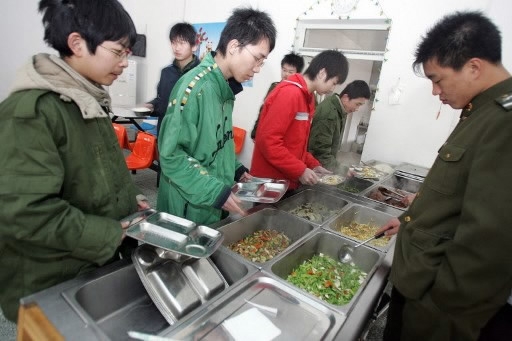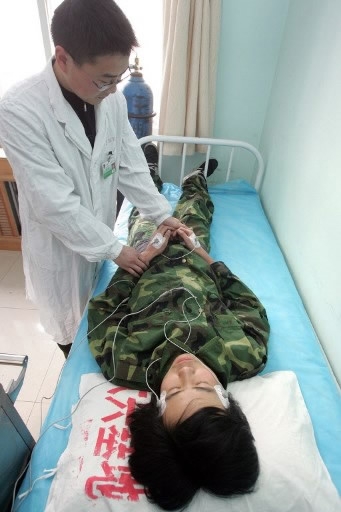A teenager died two days after he checked in to an Internet addiction camp, marking the latest tragedy at the hands of the alleged harsh addiction treatment centers in China.
On August 3, Liu Dongmei and her husband checked their 18-year-old son Li Ao into an Internet addiction treatment camp in Fuyang city in eastern China’s Anhui Province to “cure” their child’s uncontrollable use of the Internet. They paid 22,800 yuan, or nearly 3,500 US dollars, for Li's 180-day stay in the facility.
The center promised gentler approaches, such as physical activity and psychological counseling, instead of the extreme treatments which some camps are notorious for.

Teenagers assemble at the Internet Addiction Treatment Center in the southeastern suburb of Daxing in Beijing, March 1, 2007, all placed there involuntarily by their families, to go through a strict regimen that might as well be boot camp - and for good reason. / AFP PHOTO
Teenagers assemble at the Internet Addiction Treatment Center in the southeastern suburb of Daxing in Beijing, March 1, 2007, all placed there involuntarily by their families, to go through a strict regimen that might as well be boot camp - and for good reason. / AFP PHOTO
Two days later, they received a phone call. Li Ao had been taken to a hospital, where he died.
Li was found to have 20 external injuries and several internal ones, according to state media, though the exact cause of death remains unknown.
The local government shut down the center after the incident. The management and four instructors were detained by police and an investigation is under way, according to BBC.
Electronic heroin
In 2008, China became the first country to formally declare “Internet addiction” as a clinical disorder.
In 2011, Beijing Times reported about a Chinese man who died after gaming online for three days straight at an Internet café outside Beijing. In 2015, another man collapsed and died inside an Internet cafe in Shanghai after playing World of Warcraft for 19 hours straight. And in April, Xinhua reported about a 17-year-old gamer in southern China's Guangzhou who was diagnosed with cerebral infarction, after playing a popular online game for 40 hours nonstop.

A group of Chinese teenagers queue up for their meals as they undergo treatment at the Internet Addiction Treatment Center in the southeastern suburb of Daxing in Beijing, March 1, 2007. / AFP PHOTO
A group of Chinese teenagers queue up for their meals as they undergo treatment at the Internet Addiction Treatment Center in the southeastern suburb of Daxing in Beijing, March 1, 2007. / AFP PHOTO
In 2016, the total revenue of the games industry reached 165 billion yuan (24.7 billion US dollars), increasing by 17.7 percent from 2015. Despite this contribution to the economy, the way games are paid for still draws plenty of public criticism.
“Normal people can't imagine how these teenagers…use the Internet,” Tao Ran, director of the Daxing Internet-Addiction Treatment Center, said in an interview with the New York Times. “Some kids are so hooked on these games. They think taking a restroom break will affect their performance at these games. So they wear a diaper. That's why we call it electronic heroin.”
According to a report released by China Internet Network Information Center in January, 170 million under-18s are online in China. More than 24 million of which are considered “Internet addicts,” spending more than 17 hours of screen time and game play on a daily basis.
The controversial cure
As Chinese society becomes increasingly saturated with social media, more and more parents find themselves sending their web-addicted child to one of the over 300 “Internet addiction boot camps” in the country. They spend as much as 9,000 US dollars for a six-month treatment in one of these military-style camps run by public hospitals or private clinics.
The introduction of such treatment centers has not been without controversy – there have already been a number of deaths in similar facilities, and in 2016 a 16-year-old girl tied her mother up until she starved to death as an act of revenge after she was abused for four months in one of the camps.

A Chinese psychiatrist prepares a teenager, one of the more serious cases, for treatment with low-voltage electrical jolts via pins inserted into the skin, at the Internet Addiction Treatment Center in the southeastern suburb of Daxing in Beijing, March 1, 2007. / AFP PHOTO
A Chinese psychiatrist prepares a teenager, one of the more serious cases, for treatment with low-voltage electrical jolts via pins inserted into the skin, at the Internet Addiction Treatment Center in the southeastern suburb of Daxing in Beijing, March 1, 2007. / AFP PHOTO
Patients have claimed that they are regularly beaten for not following orders, have been intentionally sleep-deprived, forced to do military drills and practical work, and were given electroshock therapy as part of the programs.
In 2009, the Ministry of Health called for a stop to barbaric treatments such as physical restraints. Earlier this year, the State Council drafted laws which could ban the use of specific treatments such as electric shocks.
Parents to blame?
In the wake of the latest incident, critics have taken to Weibo to not only criticize the center but also the parents of the unfortunate young man. "In the end this is due to a lack of family education," said one commenter.
"It makes no sense for parents to blame the games for the children's addiction," said user Xielaoban. "They have to teach their children not to get addicted."
Guangming Daily commented by saying, "Some parents, upon discovering the problem, fail to reflect on their responsibility to educate, and instead want to seek third parties' help in solving the problem."
Your Score
0
/
1
Let your friends and the world know
Start it again